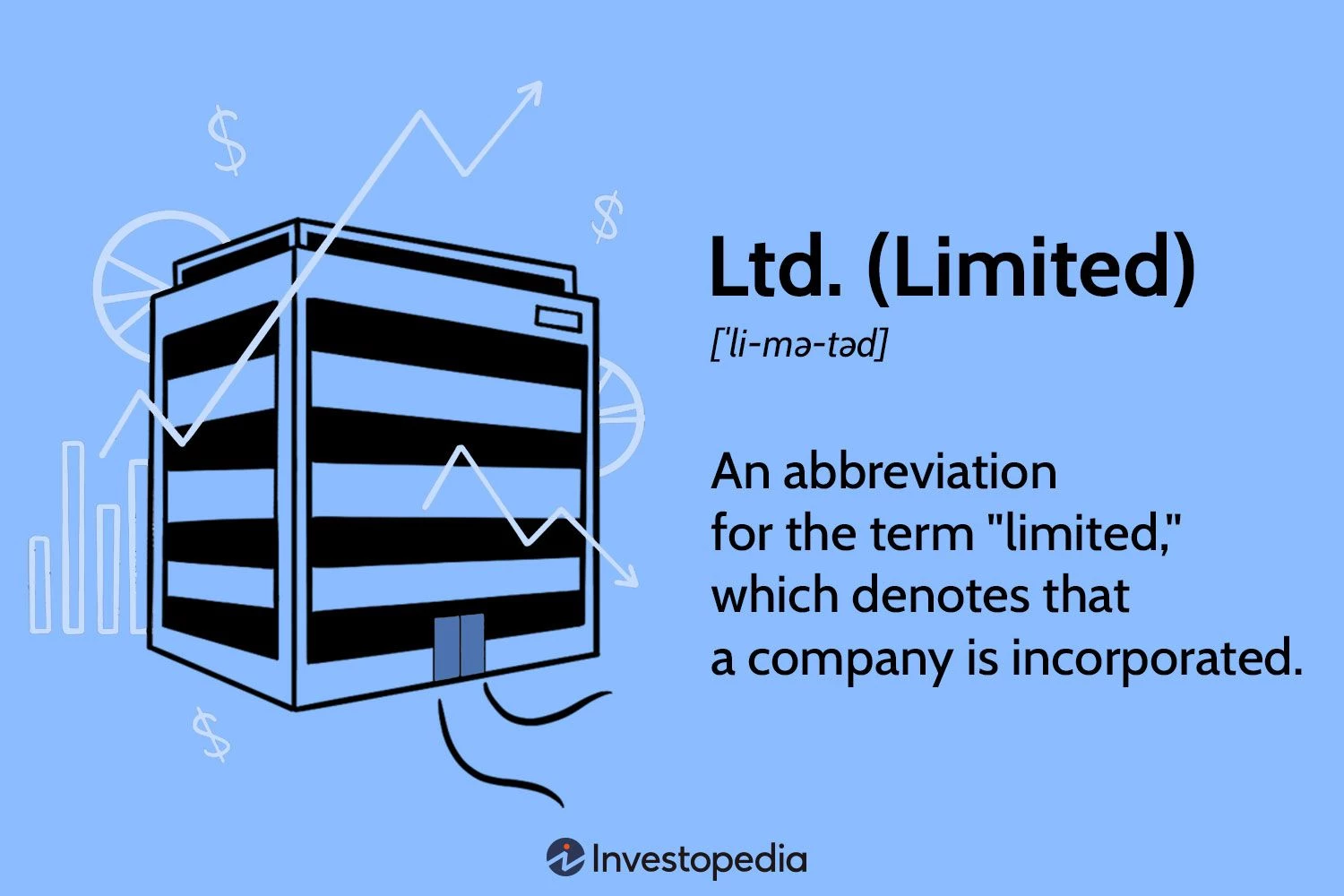What Is Ltd. (Limited)?
Ltd. stands for “limited” and is a corporate structure found in countries like the U.K., Ireland, and Canada. It is denoted as a suffix after a company’s name, indicating it is a public or private limited company.
In a limited company, the liabilities of owners and shareholders are limited to the initial capital investment. In cases of insolvency, owners’ personal assets are safeguarded because the company is a distinct legal entity responsible for its debts.
Key Takeaways:
- Ltd. is an abbreviation for “limited,” used in corporate structures in various countries.
- Limited companies shield owners’ private assets from corporate losses.
- Limited companies can be either private or public (PLC).
Understanding Ltd. (Limited)
A limited company is an independent legal entity. Owners, known as shareholders, buy shares privately. Directors, who handle administrative tasks and taxes, need not be shareholders.
Company finances are separate from owners’ and taxed independently. Profits belong to the company, paying taxes and distributing dividends to shareholders, retaining the rest as working capital. Directors can access funds through salary, dividends, or loans.
Limited companies provide limited liability akin to U.S. corporations.
Establishing a private limited company separates it from its operators. Profits are accessible post-tax, with strictly separated corporate and personal finances to avoid confusion.
Public limited companies (PLCs) are predominant in the U.K. and some Commonwealth nations. Their PLC designation signifies public status to investors and associates.
PLC stocks can be listed or unlisted on stock exchanges, subject to strict regulations and financial transparency to inform stakeholders of true stock worth and associated risks.
How to Set up a Limited Company
To establish a limited company in the U.K., essentials include:
- A business name and address
- At least one director and one shareholder
- Memorandum and articles of association
- Identifying significant company controllers
Once these are in order, registration as a private limited company can be completed.
Types of Limited Companies
Limited company models are universal but vary in regulations across nations. In the U.K., private and public limited companies are prevalent.
Private limited companies cannot offer shares to the public and are popular for small businesses. PLCs can offer shares publicly post reaching a total share value threshold.
Companies listed on the London Stock Exchange are PLCs.
In the U.S., corporations, denoted by inc. or corp., are akin to U.K. limited companies marked by Ltd.
LLCs and limited companies have distinct structures and tax filings in the U.S., requiring accurate paperwork and annual corporate tax submissions.
Advantages and Disadvantages of a Limited Company
Advantages
Limited companies offer diversified ownership and shield personal assets from corporate risks.
The tax benefits of limited companies surpass sole proprietorships, safeguarding owners from personal tax obligations.
Disadvantages
Limited capital raising potential through private shares and higher setup costs are drawbacks of limited companies.
Stringent administrative requirements and public financial disclosures in the U.K. complicate limited company operations.
Running a limited company demands adherence to accounting, tax, and regulatory standards, intensifying operational complexities.
Pros
-
Diversified ownership
-
Personal asset protection
-
Tax benefits
Cons
-
Limitations on capital via private shares
-
Higher initial costs
-
Stringent administrative norms
Are LLC and Ltd. the Same?
Limited liability companies (LLCs, U.S.) and limited companies (Ltd., U.K. and others) are distinct business structures reflecting varying ownership, liability, and tax laws in their jurisdictions. LLCs are unincorporated entities, while limited companies are incorporated.
What Are the Pros and Cons of a Limited Liability Company?
The benefits of an LLC include asset protection, pass-through taxation, and simpler filing compared to partnerships. In contrast, higher setup and maintenance costs, ownership transfer complexities, and elevated taxes are cons.
Why Do Businesses Use Ltd.?
Businesses opt for Ltd. to restrict liability to invested capital, safeguarding personal assets in cases of insolvency.
The Bottom Line
Ltd. corporations offer financial protection by limiting recourse to capital investments, safeguarding personal assets. While common in the U.K., similar structures in the U.S. bear the inc. abbreviation.
